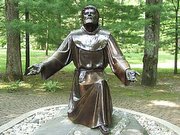Judas’ agony in the Garden
 Do you have any idea of the agony I experienced in the garden tonight? Can you imagine what it was like to hear his voice whisper gently, “Judas, do you betray your master with a kiss?”
Do you have any idea of the agony I experienced in the garden tonight? Can you imagine what it was like to hear his voice whisper gently, “Judas, do you betray your master with a kiss?”
I tell you. Those words pierced me to the quick. That is why, at this moment, I am sitting in the darkness of the night, hiding lest someone sees me and asks the same question.
Only a few days have passed since I was at the Temple, looking for someone who could lead me to Caiaphas, thinking that the High Priest might have the answer. Yes, he had an answer, thirty of them, jangling at my side, shining bright silver in the light of a candle.
I loved Jesus. Do not think, even for one moment, that I did not. He was compelling. His words were full of promise. I believed him to be the Messiah for whom we had all been waiting. I had given my life to further his cause and that is why they called me a zealot. I burned with zeal for the day when the Messiah would appear and show his face to Israel, leading us from our servitude to the might of Rome, out towards a day when Israel and the Kingdom of God would reign supreme.
Jesus talked continually of a Kingdom, describing it so clearly and beautifully that I felt I could almost reach out my hand and touch it. He would have made a good King, a great one, if only he had acted instead of talked.
It is not that he did nothing. He cured the sick. He drove out demons, claiming to be able to forgive sins. He spoke of God as his Father in such a loving way that I could believe him to be truly the Son of God.
But where was the might that would call us to gather together, to rise up against the might of Rome, driving the legions from our sacred lands? Instead he spoke of meekness and gentleness, of humility and of caring for our neighbours. He spoke to women, treated Samaritans as though they were important. He told us to become like children, declaring that if we were not children, we could have no place in heaven…but what child ever conquered an invading army?
I was frustrated. I was also angry when some of the Disciples began to accuse me of theft. How honest were they? Did they not also use some odd coins for their own purposes? I put most of the money that we received into the common purse, but I am also a good manager of money and because the purse was rarely empty, I was not praised for my astuteness and ability to drive a hard bargain. Is the bookkeeper not the first to be accused of theft? Was I always guilty? I promise you, I was not. The disciples often spoke from jealousy, not from knowledge.
I thought that, if I went to speak to the High Priest, I could move things along and force Jesus to declare his hand. If he were to be taken prisoner, he would have to speak out and summon help, would have to prove himself to be the long-awaited Messiah.
But it did not happen in that way.
He sent me away from the Passover meal. The others thought that I had been instructed to give alms to the poor. Instead, I went straight to Caiaphas.
Surrounded by soldiers and temple Guards, we made our way to Gethsemane. I knew Jesus would be there because we have rested there on many occasions. It is in the city, but is only a few minutes away from the wilderness. It seemed logical that I should point out Jesus to the guard. That would give Jesus the chance to summon his angels.
Only he did not call even to his Father. He merely whispered to me, ”Judas, would you betray your Master with a kiss?”
Mine is the agony in this garden. I cannot describe my despair, just as I cannot describe the hurt and the love in they eyes of Jesus as they led him away. I cannot carry this pain. I am weak. There is nothing I can do in order to undo my actions. I cannot turn back time. Jesus will die and his death will be because of me. He could have escaped into the wilderness, but he remained.
I cannot bear my agony.
God bless,
Sr. Janet













